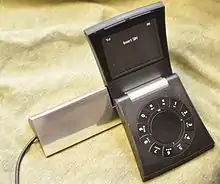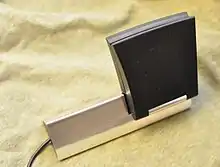Serene (phone)
Serene is a mobile phone produced as a joint venture between Samsung Electronics and Bang & Olufsen. It was released in the last quarter of 2005 in Europe. It was available in select stores throughout the world and cost $1275 (~€1000).
 Serene, open, on stand | |
| Manufacturer | Samsung Electronics and Bang & Olufsen |
|---|---|
| Compatible networks | GSM 900/1800/1900 MHz, GPRS |
| Availability by region | 2005 |
| Successor | Serenata |
| Form factor | Clamshell |
| Dimensions | 64.7 X 69.7 X 23.9 mm |
| Mass | 115 g |
| Memory | 31 MB |
| Battery | Lithium Ion 800 mAh |
| Data inputs | circular keypad |
| Display | 320 X 240 px TFT LCD, 256K colors |
| Rear camera | 0.3 megapixel |
| Connectivity | Bluetooth |
A successor to the Serene called the Serenata was announced and released in October 2007.[1] It features a slide out speaker and has a heavy focus on the music functions of the handset. Serenata retailed for $2000.[2]
The joint venture
Bang & Olufsen and Samsung formed the joint venture with the aim of competing in the high end mobile phone market, primarily competing with several handsets from Nokia. The partnership has drawn on the design strengths of Bang & Olufsen and Samsung's mobile phone technology enabling Bang & Olufsen to re-enter the mobile phone market after an absence of several years and Samsung to expand into premium mobile phones.
It is not the first time that Bang & Olufsen has worked with other companies to produce mobile phones. Notably the BeoCom 9800 was produced with Philips[3] and the BeoCom 9500 was produced in partnership with Ericsson.[4]
Handset Aims

Like most Bang & Olufsen products, the phone is industrially simplistic. The concept of the phone was brought down to pure communication and, although the phone can facilitate voice calls, text messages, multimedia messages and take pictures, its camera is only 0.3 megapixels and common, often expected, features of many common phones, such as games are not present.
Handset Design
The phone consists of two halves on an aluminium hinge. The hinges have an internal power assist motor to help open the phone completely. One half features a circular keypad with an iPod-style scroll wheel, and the other features a liquid crystal display. The handset was designed so that for standard use the screen is at the bottom of the phone, and the keypad is on the half that flips out. This was for two reasons: It stops the phone from getting greasy when you talk, and it also improves the weight balance while holding the phone. The handset also inverts so you can hold the phone up the other way if you so wished.
There are some major design flaws in the Serene. The camera is located on the side of the phone on one of the hinges which makes taking photos hard. In addition, you must use a special screwdriver to access the battery compartment.[5]
Technical specifications
| Form factor | Clamshell / Transformer |
| GSM frequencies | 900/1800/1900 MHz |
| GPRS | Yes |
| Screen | TFT, 256K colours, 320x240 pixels |
| Camera | 0.3 Megapixels |
| Multimedia Messaging | Yes |
| Built-in memory | 31 MB |
| Java | No |
| Memory card slot | No |
| Bluetooth | Yes |
| Infrared | No |
| Data cable support | Yes |
| Browser | 1.2.1 |
| Yes | |
| Music player | No |
| Radio | No |
| Video Player | No |
| Polyphonic tones | Yes, 64 chords |
| Mp3 ringtones | Unknown |
| Battery | Li-Ion 800 mAh |
| Talk time | Up to 3 h 30 min |
| Standby time | Up to 225 h |
| Weight | 115 g |
| Dimensions | 64.7x69.7x23.9 millimeters |
| Availability | Q4/2005 |
References
- "B&O Serenata review". Stuff. 4 December 2007. Retrieved 6 November 2020.
The first collaboration between Danish hi-fi gurus Bang & Olufsen and Samsung resulted in the Serene. It was a uniquely designed handset, but lacked features and was an ergonomic disaster. Far from being perturbed, the self-styled ‘dream team’ has returned with the Serenata
- https://techcrunch.com/2007/10/02/flash-samsungbang-olufsen-f310-serenata-cellphone-totally-real-totally-2000/
- "BeoCom 9800 GSM Cellular Mobile Telephone". BeoWorld. 2007-02-10. Retrieved 2008-06-18.
- "BeoCom 9500 GSM Cellular Mobile Telephone". BeoWorld. 2007-02-10. Retrieved 2008-06-18.
- Edwards, Cliff (2007-01-22). "Making the Serene Scene With B&O". BusinessWeek. Retrieved 2008-06-18.
